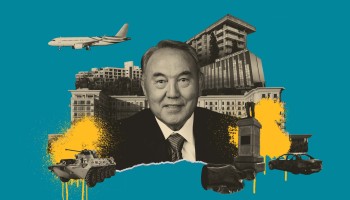He will remain head of the country’s Security Council “which is vested with serious powers” for life, Nazarbayev said in his televised statement, as well as head the ruling political party (Nur Otan, or Light of the Motherland). “That is to say, I am staying with you. The concerns of the country and the people remain my concerns,” he told the Kazakh people.
That he volunteered to step down, however, is raising eyebrows as Nazarbayev has been five times elected and his reasons remain unclear.
He has named former prime minister Kassym-Jomart Tokayev as acting president before the next presidential vote, which will be held after Nazarbayev’s term ends in April.
Nazarbayev was elected as Kazakhstan's first president in 1990. In 2007, after 17 years in power, presidential term limits were removed which had theoretically limited Kazakhstan’s presidents to a maximum of two five-year terms. In 2011, he won the presidential elections by 95.5 percent of votes. In 2015, official tallies claimed Nazarbayev had 97.75 percent of the vote.
Of this, the Organization for Security and Cooperation in Europe (OSCE) said that "voters were not offered a genuine choice between political alternatives," and they noted "significant restrictions to the freedom of expression, as well as to the media environment."
More than one of Nazarbayev’s opponents have ended up dead, according to Al Jazeera. In 2006, opposition leader Altynbek Sarsenbayuly was shot dead along with his bodyguard and driver. That same year Zamanbek Nurqadilov, another opposition figure who was critical of Nazarbayev, was found dead at his home.
Nazarbayev's former son-in-law, Rakhat Aliev who is suspected of one of the murders of Nazarbayev’s opponents, was also found dead, hanged in a jail cell in 2015 while serving time for another murder. Al Jazeera suggests there are some who think it was not suicide.
The Business Anti-Corruption Portal – endorsed and sponsored by the European Commission – details some of the rampant corruption in Kazakhstan. It accuses Kazakhstan’s judicial system as ineffective and unreliable in prosecuting bribery.
It details the difficulty foreign companies face when doing business in Kazakhstan. “Bribes and irregular payments are widespread in the process of awarding contracts and licenses,” and businesses complain of corruption in every form of business, from obtaining licenses to construction, to having to pay bribes when applying for public utilities such as water or electrical connections.
It also suggests that the government often stalls on “getting things done” as a means to pressure companies into “giving up contractual concessions in return for services” that companies are otherwise entitled to.
Last Thursday, Nazarbayev fired the government over what he described as its failure to improve living standards and to make positive changes in the country. He promised to impose measures to strengthen social welfare and raise people's quality of life.






